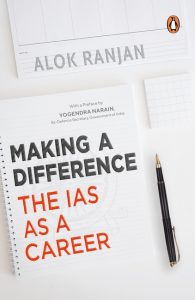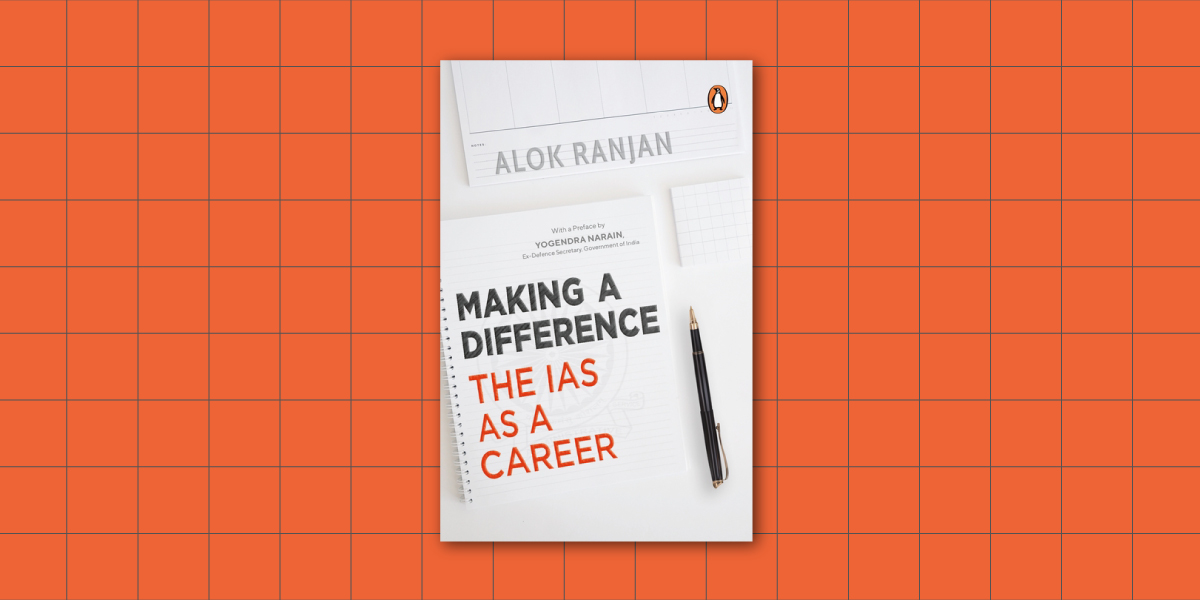Here’s an excerpt from Making a Difference by a successful retired IAS officer, Alok Ranjan, who served with distinction in various assignments in the State Government as well as the Government of India.
*

Working with the State Government
A very revealing incident took place when I was the Principal Secretary Urban Development and the urban local body elections were to take place. They were thirteen posts of mayors and as per the act and rules, there was a clear roster system to determine which seat would be general, which reserved, which would go to women, etc. The CM wanted particular candidates to contest from specific municipal corporations and I was summoned by the CM Office and given the brief to prepare the roster accordingly. I explained that this is not possible as the rules and their interpretation was clear. The stratagem of taking legal opinion was then adopted by the CM Office and the Principal Secretary Law interpreted the rules differently which accommodated eight out of the thirteen proposed mayor candidates. I said that I did not agree with the opinion but if given in writing, I would abide by it. However, the CM was keen that at least three other proposed mayoral candidates should be accommodated in the roster. To my utter disbelief I was called and told by the CM Office in the presence of the Principal Secretary Law that for eight seats, the interpretation given by the law department should be used while for other three, my earlier interpretation should be employed. I had to show my dissent by saying that I could agree with an interpretation I felt was wrong if given in writing, but I had to be consistent and could not possibly choose different interpretations for different mayor seats. At my refusal, the officers present looked at me as they would at a goat about to be sacrificed and I realized that my goose was cooked and mentally began to prepare for my transfer. Imagine my surprise and amazement when the CM saw my point and agreed with it. It just shows that often the officers close to the CM try to be holier than the king. If they put up both sides of the picture to the CM they will invariably get to the right decision.
Secretariat working is all about files which are almost like living organisms having a life and energy of their own. A good Secretariat officer believes in not keeping files pending and he is proud to proclaim that his table is clear. However, this movement of files has little relation to actual decisions being taken and on closer examination, he will find that the files have been sent to law, finance or personnel departments for advice. The files move to and fro with volumes of noting which ensures that no accountability can be fixed on anyone at a later date. A close relative of this strategy is the formation of a committee to examine the matter which takes its own sweet time to give a voluminous report. Even developing a system of tracking files and prescribing maximum time limit for files to stay at a particular desk does not help.
The Principal Secretary of a department is expected to provide leadership to his team. He has to have the skill set to build the team which shares the objectives and goals of the department and works towards its fulfillment. The key task is to prepare the budget of the department, then release the budget to the field officers and monitor physical and financial progress. Above all, he has to assess the problems in his department, resolve them and achieve the required outcomes. Unfortunately, this does not often happen as the officers are more concerned about processes than giving results. Calling or attending a meeting becomes an end in itself and occupies the majority of the time of the secretaries and the heads of the departments. The job of a Principal Secretary is not only to assist in policy formulation but ensure implementation. Often we hear the rather unfair and incorrect statement that policies are good but implementation is poor. The reality is that policies are framed in the rooms of the Secretariat overlooking the harsh realities at the field level and a good policy must take into account how it can be executed…
To really play a transformational role, the officer must focus on results and outcomes but unfortunately, the officer is often more concerned about the process than delivering results. I have personally seen many brilliant officers mellow down in the Secretariat to the level of becoming ‘inaction wonders’. They disconnect themselves from the field and get mired in the rules and regulations with the results that the files become thicker, with no difference being made to the actual delivery of public services. For instance, if an officer is Secretary in the urban development department and is busy disposing of files while cities are full of garbage and filth rotting on the roads, then it implies that his working has no connection with the real issues confronting his department. Similarly, there is no purpose served by the Health Secretary clearing files on a daily basis if the quality of healthcare remains abysmally poor. Teachers remain absent from schools while the Secretary Education is busy issuing detailed guidelines and instructions which have a total disconnect with the realities in the field. This leads to discontentment amongst the people as they are receiving poor quality of public services. It is, thus, mandatory to make better outcomes the focus of each and every department and the performance of all the Secretariat, departments should be measured accordingly…
Working with the Government of India
The biggest attraction of a GOI posting is the international exposure. In simple language, it means the prospect of foreign travel and also a chance of a foreign posting. Ministries are categorized according to the avenues of foreign travel that they promise. That is why ministries like commerce are sought after and the competition to get into them is high. When the GOI officers meet each other, the common topic of conversation is the number of countries that an officer has visited. Some claim to have crossed the half-century mark whereas others make tall claims of having scored a century. I happened to go as JS Defence and defence was a ministry which had very few opportunities for foreign travel. If at all they travelled, it was mostly to Russia. Many of my colleagues looked sympathetically at me and said ‘could you not manage a better ministry? ’I was told that most officers avoid PHD ministries – personnel, home and defence – as they have the least chances of foreign travel. So, defence, despite being such an important strategic ministry, has few people opting for it. Within the ministries too there is intense competition for the international co-operation desk. A foreign posting or deputation to an international organization is highly coveted. This is despite the fact that these assignments do not give great opportunities for doing challenging work. Late T.S.R. Subramaniam who retired as Cabinet Secretary and had served in the state, center and in an international organization, had commented in his book that the maximum work is done in the districts, then the state government, then the GOI and finally the international organization where you have a lot of time on your hands. Still, the lure of the international posting is there.
The GOI concerns itself with policy formulation at the national level and is generally not involved in the implementation aspect, which is the responsibility of the state governments. In some departments like defence, external affairs and commerce, all the action is at the GOI level. There are, however, huge GOI bureaucracies dealing with subjects on the concurrent or the state lists. Sometimes, one wonders whether it is necessary at all. For example, the Ministry of Agriculture in the GOI has ten Joint Secretaries whereas agriculture is a state subject. There is a serious case for reduction in the size of certain ministries at the centre and also of clubbing several ministries together as it is strange that the Ministry of Agriculture is not involved with issues related to fertilizer, water or agriculture credit.
The ministries of such size at the GOI exist because of political reasons and also the bureaucratic culture of creating work to perpetuate work and justify itself. The major mechanisms for this are the centrally sponsored schemes where the major financial contribution (60 per cent or 75 per cent) is done by the centre and schemes are formulated at the GOI level with detailed guidelines. The problem arises as no two states are alike. The same schemes will succeed in one state but the conditions in other states will not favor its implementation. Thus, the states constantly argue that funds should be transferred to them and they be left free to design schemes. However, there is no denying that there is greater wisdom available at the GOI due to its knowledge about the best practices in the states, presence of experts and availability of international inputs. The GOI involves stakeholders, specialists and consultants in designing policy and the due diligence done is of a very high order. Yet, there cannot be a universal policy looking at the extreme variations between states. The solution, as usual, has to be in between…
To succeed in GOI, one needs to study the department in detail, understand crucial issues, articulate your viewpoint and have the ability to carry officers of other services and specialists along with you. It requires great qualities of leadership to set the goals and milestones for your departments and then lead the entire team towards fulfilling them. A dedicated officer will always find working in the Government of India to be a transformational opportunity.
**
For all IAS aspirants, Making a Difference will prove to be a book of great significance.









